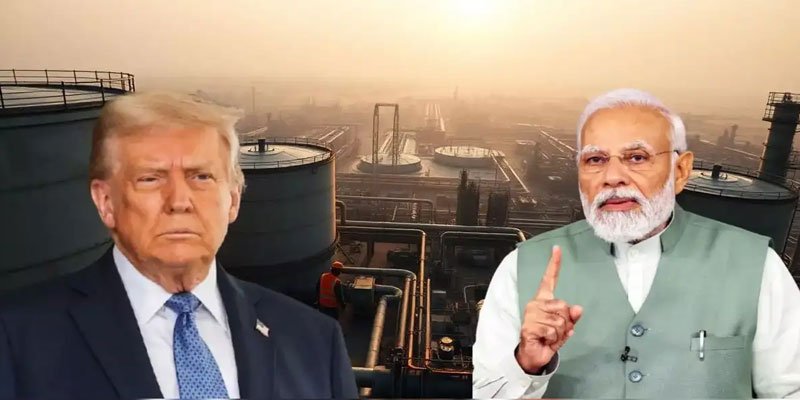
India Defiant as Trump Threatens Tariffs Over Russian Oil Imports
Trade Tensions Reignite Amid Energy Diplomacy
In a familiar echo of past trade disputes, US President Donald Trump has reignited tensions with India, threatening steep tariff hikes over New Delhi’s continued import of Russian oil. India, however, remains firm, defending its purchases as essential for national energy security amid volatile global markets. As the US and its allies try to tighten economic pressure on Moscow over the war in Ukraine, India’s strategic energy decisions and Washington’s growing frustrations are now at a crossroads. At the heart of the matter is a clash of geopolitics, economics, and energy policy — with India caught between affordability and global expectations.
India’s Oil Imports: A Necessity, not a Choice
The Ministry of External Affairs (MEA) in New Delhi issued a sharp rebuttal to Trump’s accusations, labeling his criticism “unjustified and unreasonable.” According to the MEA, India’s decision to import Russian crude is a direct response to supply disruptions caused by the Ukraine conflict, which diverted traditional energy routes to Europe. Facing a domestic need to keep energy prices stable for its 1.4 billion citizens, India argues that these imports are a matter of sovereign economic policy, not political alignment.
The MEA further pointed out that India’s energy purchases are guided purely by market dynamics and national interest. “India will take all necessary measures to safeguard its national interests and economic security,” the ministry said, emphasizing that Western nations criticizing India are themselves engaged in substantial trade with Russia.
The Hypocrisy Charge: Pointing Fingers Back at the West
In a detailed breakdown of ongoing trade patterns, Indian officials highlighted what they call a double standard. In 2023 alone, the European Union maintained a EUR 67.5 billion goods trade and EUR 17.2 billion services trade with Russia — figures significantly higher than India’s total trade with Moscow. The EU’s liquefied natural gas (LNG) imports from Russia even hit a record 16.5 million tonnes in 2024.
Meanwhile, the United States continues to source strategic materials like uranium hexafluoride for its nuclear energy industry and palladium for electric vehicle production from Russia. Fertilizers and other chemicals remain on America’s import lists. In light of this, India asserts that Western economies are hardly in a position to take the moral high ground.
Trump’s Threats: Posturing or Policy?
Trump, speaking via his Truth Social platform, accused India of buying “massive amounts” of Russian oil and allegedly reselling it for profit, claiming it undermines efforts to isolate Moscow. Vowing to respond, he pledged to “substantially raise the tariff paid by India to the USA,” pushing existing tariffs from 10% to 25%.
This rhetoric follows a broader Republican campaign line — echoed by officials like Secretary of State Marco Rubio and Deputy Chief of Staff Stephen Miller — targeting India’s energy decisions. But as of now, there's no indication that India will bow to this pressure.
Why India Won’t Back Down
Indian officials believe Trump’s threats are unlikely to alter New Delhi’s course. Behind closed doors, there is growing consensus that India must not let external powers dictate its energy policy — particularly one that is crucial to inflation control, economic stability, and affordable fuel prices at home.
Analysts also argue that any move by India to halt Russian imports would have limited global impact. As Pankaj Saran, former Deputy National Security Adviser and ambassador to Russia, put it, “Even if India cuts imports to zero, China will not. Russia will sell to China at a discount, making Beijing the real beneficiary.” In essence, restricting India’s access to discounted crude would not only hurt India but potentially strengthen China.
Moreover, by purchasing Russian oil under the price cap imposed by the West, India has helped temper global oil prices. One Indian energy expert explained that without India’s role in absorbing discounted Russian crude, combined with OPEC’s 5.86 million barrels/day production cuts, prices could have easily surpassed the March 2022 peak of $137 per barrel, exacerbating inflation globally.
Western Validation: A Policy India Was Once Urged to Follow
Perhaps the most revealing irony lies in earlier US support for India’s oil strategy. Former US Ambassador to India Eric Garcetti had publicly praised India’s purchases in 2024, saying it was in line with Washington’s policy to maintain a price cap without disrupting global supply. “They bought Russian oil because we wanted somebody to buy Russian oil at a price cap. That was not a violation… It was the design of the policy,” Garcetti said in a widely circulated video.
This makes Trump's reversal even more puzzling for Indian officials, who see the latest threats as political theater rather than a shift in serious policy consensus.
Strategic Autonomy Trumps Pressure Politics
As Trump amps up his rhetoric and tariff threats, India appears unfazed. The country’s energy policy is rooted in pragmatism — a mix of affordability, diversification, and sovereignty. Despite the pressure from Washington, especially during an election season, Indian policymakers are unlikely to trade critical energy access for appeasement.
In fact, experts say Trump’s threats may only reinforce India’s resolve to preserve its autonomy in strategic decision-making. As global energy dynamics continue to evolve, New Delhi seems determined to ensure its national interests remain insulated from geopolitical arm-twisting — no matter where it comes from.






